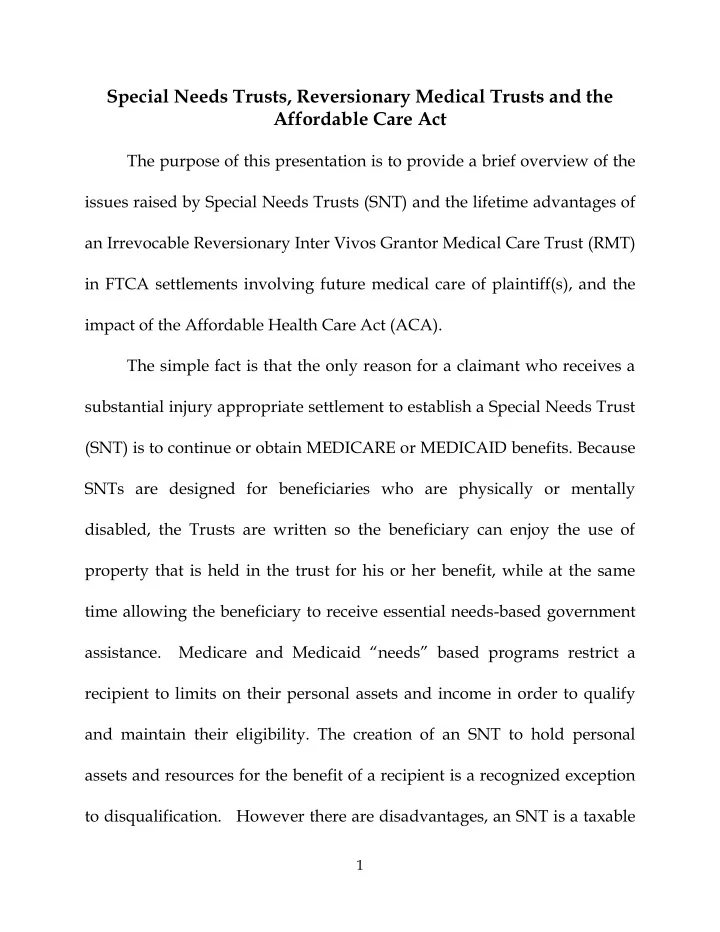

Special Needs Trusts, Reversionary Medical Trusts and the Affordable Care Act The purpose of this presentation is to provide a brief overview of the issues raised by Special Needs Trusts (SNT) and the lifetime advantages of an Irrevocable Reversionary Inter Vivos Grantor Medical Care Trust (RMT) in FTCA settlements involving future medical care of plaintiff(s), and the impact of the Affordable Health Care Act (ACA). The simple fact is that the only reason for a claimant who receives a substantial injury appropriate settlement to establish a Special Needs Trust (SNT) is to continue or obtain MEDICARE or MEDICAID benefits. Because SNTs are designed for beneficiaries who are physically or mentally disabled, the Trusts are written so the beneficiary can enjoy the use of property that is held in the trust for his or her benefit, while at the same time allowing the beneficiary to receive essential needs-based government assistance. Medicare and Medicaid “ needs ” based programs restrict a recipient to limits on their personal assets and income in order to qualify and maintain their eligibility. The creation of an SNT to hold personal assets and resources for the benefit of a recipient is a recognized exception to disqualification. However there are disadvantages, an SNT is a taxable 1
entity and needs to pay tax on any internal build-up at the prevailing trust tax rates. It is also not entitled to deductions for medical expenses paid through the SNT until the entire amount of the corpus has been expended for medical expenses on behalf of the recipient. Irrevocable Reversionary Inter Vivos Grantor Medical Care Trust (RMT) would achieve the same benefits as a SNT but also allow for more flexibility and tax-free asset growth. The RMT in the context of a FTCA settlement with the federal government is funded and owned by the United States for the benefit of a disabled plaintiff(s). Any RMT established and administered by the United States is a non-taxable entity with other benefits such as continuity and security to any injured or disabled plaintiff(s). The RMT would, however, be considered in determining eligibility for Medicare/Medicaid benefits. In addition, the United States retains a reversionary interest in any amount remaining in the RMT after the passing of the plaintiff(s). A comparison between a Special Needs Trust and an Irrevocable Reversionary Inter Vivos Grantor Medical Care Trust, the critical issue and advantage of the RMT is that a SNT is taxable to the beneficiary while all the assets in a RMT grow tax free. As stated above, there are no tax 2
deductions for medical expenses available to offset the earnings or capital gains within a SNT trust until the full amount of corpus used to establish the SNT is expended for the benefit of the recipient. This provides a significant advantage to the injured party through a RMT. In short, there is no more efficient mechanism to maximize the available assets to the advantage of the claimant. Incorporating the advantages of the Affordable Care Act into a SNT or RMT significantly reduces the cost of the Life Care Plan simply by purchasing a ACA health insurance policy. The ACA mandates coverage with no maximum payout amounts, no pre-existing condition clause, and there is age standard pricing and 10 essential elements of coverage that must be incorporated in any plan. The simple fact is that the present day value of providing any/all of the items in a life care plan that are covered by “essential elements” is the cost of a ACA premium plan plus the co -pays up to the annual maximum cost per year under the law. Since a policy can be purchased after the fact of an injury or a settlement, there is no “collateral source” rule that comes into play. Therefore, the reduction in the cost to fund a RMT is drastically reduced and the benefits for the claimant 3
are equal or better than what may normally be provided without needing to meet the eligibility requirements of an SNT. 4
Recommend
More recommend